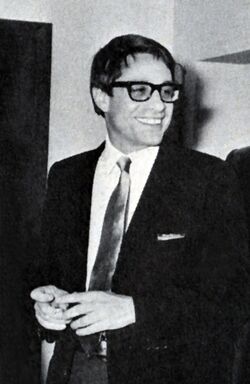Biography:Luigi Magni
Luigi Magni | |
|---|---|
 | |
| Born | Rome, Italy |
| Died | 27 October 2013 (aged 85) Rome, Italy |
Luigi Magni (21 March 1928 – 27 October 2013) was an Italian screenwriter and film director.
Life and career
Born in Rome, Magni started his career as a screenwriter, in 1956, with Tempo di villeggiatura.[1] In 1968 he collaborated with Mario Monicelli to a real "event" of the Italian cinema as the transformation of Monica Vitti in a comedic actress with The Girl with the Pistol, and the critical and commercial success of the film pushed him into directing.[1] After the directorial debut with Faustina (which was also the debut film of Vonetta McGee), in 1969 Magni achieved an extraordinary success with Nell'anno del Signore, which was the highest-grossing Italian film of the year, so as to require for the first time in Italy nighttime screenings to meet the demands of the audience.[1][2] The film marked the encounter with Nino Manfredi, with whom Magni had a long-standing association on the set (including the screenplay of Manfredi's award-winning film Per Grazia Ricevuta) and a close friendship off the set. The film also defined Magni's style, namely a commedia all'italiana mainly centred on Rome and its history, particularly the epoch between the Papal States and the Risorgimento.[2]
In 1977 Magni achieved critical recognition with In nome del Papa Re, which also gave him his first David di Donatello Award.[1][3] He received a second David di Donatello in 1995, for the screenplay of Nemici d'infanzia, and a special David di Donatello Lifetime Career Award in 2008.[1][3]
In 1991 he was a member of the jury at the 17th Moscow International Film Festival.[4] After the 2003 TV movie La notte di Pasquino, a sort of sequel of Nell'anno del Signore still with Nino Manfredi as the main actor, and with the death of Manfredi in 2004, Magni retired from cinema.[1] He died in Rome, on 27 October 2013.[5]
Filmography
Screenwriter
- La cambiale (1959)
- Il corazziere (1960)
- Gli attendenti (1961)
- Il mio amico Benito (1962)
- In Italia si chiama amore (1963)
- Un tentativo sentimentale (1964)
- Le voci bianche (1964)
- Extraconiugale (1964)
- La Celestina P... R... (1964)
- Le bambole (1965)
- La Mandragola (1965)
- Madamigella Di Maupin (1965)
- Le fate (1966)
- Non faccio la guerra, faccio l'amore (1966)
- El Greco (1966)
- La cintura di castità (1967)
- Le streghe (1967)
- Il marito è mio e l'ammazzo quando mi pare (1967)
- La ragazza con la pistola (1968)
- Faustina (1968)
- Nell'anno del Signore (1969)
- Scipione detto anche l'Africano (1971)
- Per grazia ricevuta (1973)
- La Tosca (1973)
- La via dei babbuini (1974)
- Basta che non si sappia in giro (1976)
- In nome del Papa Re (1977)
- Arrivano i bersaglieri (1980)
- State buoni se potete (1983)
- Secondo Ponzio Pilato (1987)
- 'o Re (1989)
- In nome del popolo sovrano (1990)
- Nemici d'infanzia (1995)
- La Carbonara (2000)
Director
- Faustina (1968)
- Nell'anno del Signore (1969)
- Scipione detto anche l'Africano (1971)
- La Tosca (1973)
- La via dei babbuini (1974)
- Basta che non si sappia in giro (1976)
- Quelle strane occasioni (1976)
- In nome del Papa Re (1977)
- Signore e signori, buonanotte (1977)
- Arrivano i bersaglieri (1980)
- State buoni se potete (1983)
- L'addio a Enrico Berlinguer (1984)
- Secondo Ponzio Pilato (1987)
- Imago Urbis (1987)
- 'o Re (1989)
- In nome del popolo sovrano (1990)
- Nemici d'infanzia (1995)
- Esercizi di stile (1996)
- La Carbonara (2000)
References
- ↑ 1.0 1.1 1.2 1.3 1.4 1.5 "È morto Luigi Magni, raccontò magistralmente la Roma papalina sul grande schermo". La Repubblica. 28 October 2013. http://www.repubblica.it/spettacoli/cinema/2013/10/27/news/morto_luigi_magni_raccont_magistralmente_roma_sul_grande_schermo-69567831/. Retrieved 28 October 2013.
- ↑ 2.0 2.1 Enrico Giacovelli. La commedia all'italiana. Gremese Editore, 1990. ISBN 8876054995.
- ↑ 3.0 3.1 Enrico Lancia. I premi del cinema. Gremese Editore, 1998. ISBN 8877422211.
- ↑ "17th Moscow International Film Festival (1991)". MIFF. Archived from the original on 3 April 2014. https://web.archive.org/web/20140403102003/http://www.moscowfilmfestival.ru/miff34/eng/archives/?year=1991. Retrieved 2 March 2013.
- ↑ "Cinema, è morto Luigi Magni". Corriere della Sera. http://cinema-tv.corriere.it/cinema/13_ottobre_27/cinema-morto-luigi-magni-fff7aca8-3f07-11e3-849f-64e2eb8e7cda.shtml. Retrieved 27 October 2013.
Further reading
- Marina Piccone, Conversazione con Luigi Magni: la vita, il cinema, la politica. Effepi Libri, 2008. ISBN:8860020131.
- Franco Montini, Piero Spila, Il mondo di Luigi Magni : avventure, sogni e disincanto. Rai Eri, 2000. ISBN:8839711341.
External links
- Luigi Magni on IMDb

